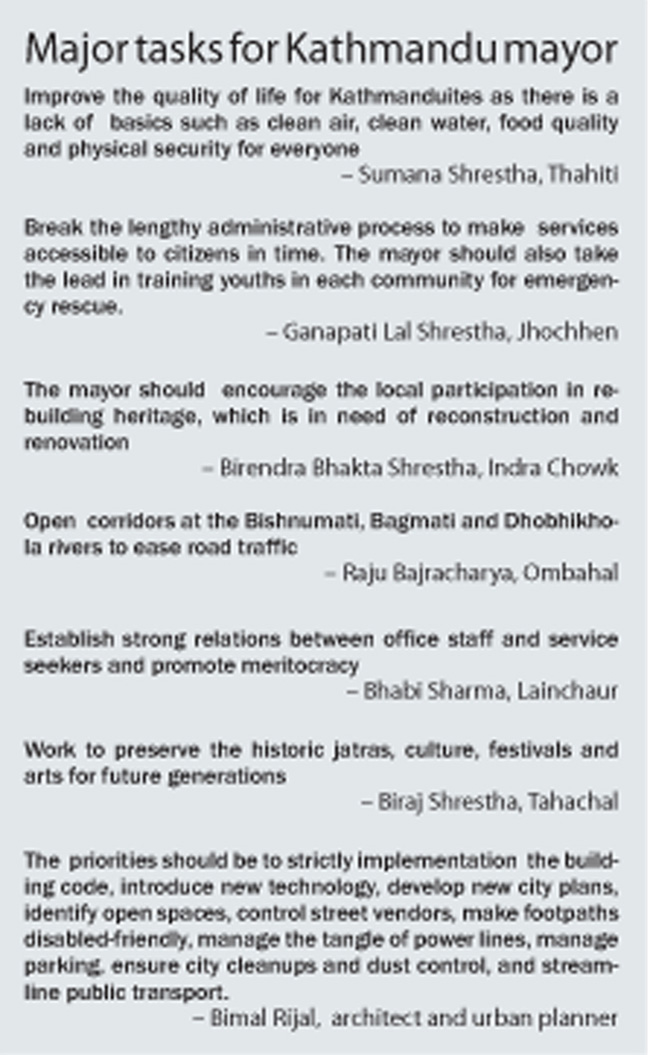 |
| Image: Republica National Daily |
KATHMANDU, May 10: Sumana Shrestha, a local youth from Thahiti, doesn't appreciate political leaders who speak of turning Nepal into a Singapore or Switzerland, with high riseses and metro rails.
She dreams of a capital that proudly preserves its heritage and culture as a unique city in the world.
Asked what should be the major tasks of the mayor of Kathmandu Metropolitan City (KMC) when he or she is elected in the upcoming local elections, Shrestha said it would be a challenge for the mayor to improve the quality of life for Kathmanduites, given the lack of basics such clean air, clean water, food quality and physical security.
An MBA from the MIT Sloan School of Management in the US, Shrestha coordinated relief supplies donated by her friends in America for the earthquake-affected villages in Nepal.
“There is also a big challenge of renovating and reconstructing the heritage sites which were damaged during the earthquakes in 2015,” she says. “We shouldn't waste our time just talking about imported ideas but create a contextual vision for the capital city.”
Like Shrestha, the citizens of Kathmandu are unimpressed by the lofty promises of mayoral candidates such as monorails and metro systems. What they want are ordinary things such as controlling pollution, water supply and garbage disposal.
“Mayoral candidates should understand the real problems of the city. We do not need lofty promises that may take years to fulfill, but only promises to address our real issues,” said Ganapati Lal Shrestha, a youth from Jhochhen.
Shrestha wants the new mayor cut the lengthy administrative processes and make service delivery easily accessible to citizens. “When I go to a ward office to register a file for forwarding to the mayor's office, most of the time I don't see anyone there. If a staffer is present, he or she makes some excuse to delay the work,” he said.
He further said that the mayor should work not for his party or party cadres but for the people. “Kathmandu is a cultural city where hundreds of thousands of tourists visit every year. The earthquakes of 2015 damaged the cultural structures. The new mayor should come with a plan to expedite the preservation work at all heritage sites,” he said.
With the local polls fast approaching after a gap of some 20 years, the people of Kathmandu are eager to see real changes.
Birendra Bhakta Shrestha of Indra Chowk wants a leader who can make drastic changes in this city. “I don't believe anyone who makes announcements just for getting votes. I will choose someone who is sincere about translating such announcements into action and has the needed zeal,” he said.
Shrestha is currently initiating a campaign to rebuild the historic Kasthamandap Temple with the support and participation of locals.
“I believe we can rebuild our heritage on our own. We don't need any donors or contractors. The mayor should encourage local participation in heritage rebuilding,” he added.
The new mayor must change the mindset of municipality staff, said Raju Bajracharya of Ombahal.
“The staff behave as though we don't have the right to seek any services or information from them,” he explained.
The mayor should work to open the Bishnumati, Bagmati and Dhobhikhola corridors to ease vehicular movement in the capital, he said. “He/she must expedite the decades-old town planning projects at Khusibu, Chamati and Manohara.”
Management of dust pollution and related health problems should be another key task for the mayor.
Bhabi Sharma of Lainchaur said the mayor of Kathmandu should foster good relations between his office staff and service seekers; promote meritocracy and work for the people rather than just for his political party.
“We won't feel any change until he or she repairs the sewage pipes and roads, among other things,” he said.
Biraj Shrestha of Tahachal has suggested the mayor work at preserving the historic jatras, culture and arts for future generation.
“We lack public spaces in town. There are no proper places to spend a few moments or play some games,” he said.. “The new mayor should introduce special programs to address this problem.”
Bimal Rijal, an architect and urban planner, suggested that the mayor should work for organizational improvements with the introduction of technology in service delivery. “As there was a leadership vacuum for the last 20 years, service delivery has worsened,” he said. “It has become urgent to launch some concrete steps to remove hurdles in service delivery.”
Rijal said that the new leadership should give priority to strictly implement the building code, develop city planning, identify open spaces, control the street vendors, make foothpaths disabled-friendly, manage the maze of tangled power lines and wires, improve parking management, keep the city clean, control the dust, and improve public transport, among many other things.
“Transport management in Kathmandu has become very challenging due to its fast growing population. The mayor should take the initiative to launch a metro rail and mass transit system,” says Rijal.
He emphasized that damaged cultural heritage in the core city areas such as Basantapur, Indra Chowk and New Road should be restored.
“Kathmandu as a cultural and economic hub has a responsibility to introduce new systems and initiatives so that emerging cities can learn from it,” he added.